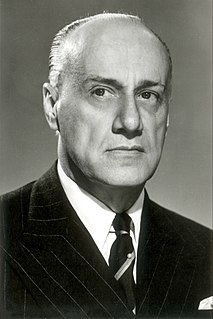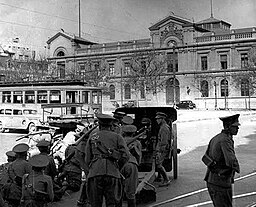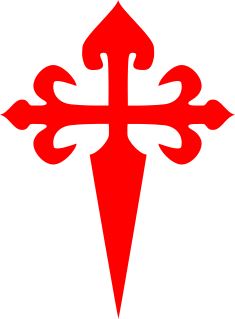Democratic Party Partido Democrático | |
|---|---|
| Founded | 1932 |
| Dissolved | 1960 |
| Split from | Democrat Party |
| Merged into | National Democratic Party |
| Headquarters | Santiago de Chile |
| Political position | Centre-left |
The Democratic Party (Partido Democrático) of Chile was a Chilean political party created by a left-wing faction of the Democrat Party in 1932. It was created by a leftist faction of the Democrat Party, which opposed the right-wing group that officially supported the government of Arturo Alessandri.

Chile, officially the Republic of Chile, is a South American country occupying a long, narrow strip of land between the Andes to the east and the Pacific Ocean to the west. It borders Peru to the north, Bolivia to the northeast, Argentina to the east, and the Drake Passage in the far south. Chilean territory includes the Pacific islands of Juan Fernández, Salas y Gómez, Desventuradas, and Easter Island in Oceania. Chile also claims about 1,250,000 square kilometres (480,000 sq mi) of Antarctica, although all claims are suspended under the Antarctic Treaty.
Left-wing politics supports social equality and egalitarianism, often in opposition to social hierarchy. It typically involves a concern for those in society whom its adherents perceive as disadvantaged relative to others (prioritarianism) as well as a belief that there are unjustified inequalities that need to be reduced or abolished. The term left-wing can also refer to "the radical, reforming, or socialist section of a political party or system".

The Democrat Party of Chile was a Chilean political party created by a left-wing faction of the Radical Party in 1887. It was created to protect the working and middle class, but over the years it became a traditional political movement, with factions of center-right and center-left.
Although they supported the presidential candidacy of Alessandri, eventually became opponents. In 1937, they joined the Popular Front and supported the candidacy of Pedro Aguirre Cerda. In 1941, they merged with the Democrat Party.
The Popular Front in Chile was an electoral and political left-wing coalition from 1937 to February 1941, during the Presidential Republic Era (1924–1973). It gathered together the Radical Party, the Socialist Party, the Communist Party, the Democratic Party and the Radical Socialist Party, as well as organizations such as the Confederación de Trabajadores de Chile (CTCH) trade-union, the Mapuche movement which unified itself in the Frente Único Araucano, and the feminist Movimiento Pro-Emancipación de las Mujeres de Chile (MEMCh).

Pedro Aguirre Cerda was a Chilean political figure. A member of the Radical Party, he was chosen as the Popular Front's candidate for the 1938 presidential election, and was triumphally elected. He governed Chile until his death in 1941. Pedro Aguirre Cerda was of Basque descent.
In the 1940s again were divided in the Democratic Party of Chile and the People's Democratic Party . Both parties were reunited in 1956. The party was dissolved in 1960, when meeting with other organizations to form the National Democratic Party (PADENA).
The People's Democratic Party was a political party in Chile. It was founded through a split in the Democratic Party. PDP was part of the 1952 People's Alliance that supported Carlos Ibáñez del Campo in the 1952 presidential election. In 1956 the PDP joined the Popular Action Front (FRAP). In 1956 PDP merged again into the Democratic Party.

The National Democratic Party, known by its acronym PADENA, was a Chilean political party. This party was one of the last political movements linked to the figure of President Carlos Ibáñez del Campo.










